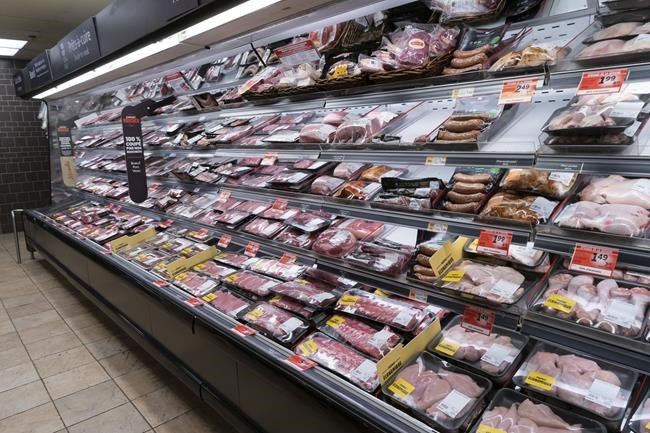Grocery prices are still rising at a far higher annual pace than overall inflation, but experts expect to see them continue moderating as the year progresses.
The price of groceries grew 8.5 per cent in July compared with last year, down from a 9.1 per cent year-over-year gain in June, according to Statistics Canada. The slower growth was mainly thanks to easing prices in the fresh fruit and bakery products categories, the agency said.
Eight and a half per cent is still a far cry from the headline inflation reading of 3.3 per cent in July, which has significantly fallen from a high of more than eight per cent last year.
But looking at the year-over-year increase in food prices doesn’t tell the whole story, said Michael von Massow, a food economy professor at the University of Guelph in Ontario.
Some of the biggest monthly increases in food prices happened last fall, meaning the annual rate of food inflation is skewed by those, he said. On a month-over-month basis, grocery prices actually rose slower than overall inflation in July.
However, there’s no question that food prices are still rising, albeit slower, he said, and that consumers are feeling the pinch.
“We can’t defer food purchases,” he said. “We can change our behaviour with driving if we want, we can defer the purchase of a new computer ... but we can’t defer food.”
As the months wear on, the annual rate of food inflation is likely going to keep trending lower since it will increasingly factor out last fall’s oversized increases, von Massow explained.
The Bank of Canada’s interest rate hikes don’t have a direct effect on food inflation but can indirectly pressure consumers to spend less at restaurants or grocery stores, said von Massow — but only to a certain extent.
There’s some reason for optimism in the coming months, as seasonal harvests in Canada could help ease the cost of some fruits and vegetables, said von Massow. But food prices are also much more vulnerable to the effects of extreme weather, and could also be impacted by the war in Ukraine as Russia exited its grain export deal, he said.
“The one thing we can be sure of is there’s going to be more volatility.”
Food price inflation is expected to continue easing in the coming months as lower commodity prices and easing supply chain pressures pass through to retail products, said RBC economist Claire Fan. Overall food price inflation is expected to fall closer to five per cent by the end of the year, she said.
While prices are still much higher than they were a year ago, consumers can at least look forward to fewer surprises at the grocery store, Fan said.
However, over the longer term, extreme weather around the world will add more pressure to food prices, she said.
Some forecasters are saying the latest inflation report has raised the odds of an interest rate hike next month from the Bank of Canada.
A hike isn't entirely out of the question, but there's more economic data to come before the central bank makes its decision, Marwa Abdou, senior research director at the Canadian Chamber of Commerce, said in a statement.
"So much of the downward momentum and cooling that we’ve seen over the past few months has been overstated progress from soaring gas prices a year ago," Abdou said.
"While those effects have now peaked, and heftier grocery bills, mortgage interest rate costs and energy prices remaining a pain point for Canadian consumers, we’re now getting a chance to focus on the real work that remains ahead."
Meanwhile, Fan says the central bank is likely to hold rates at its next meeting in September, opting to wait for more economic data as the economy shows signs of weakening in key areas like the labour market.
"From this point forward, the bar to keep moving interest rates higher is quite high," she said.
This report by The Canadian Press was first published Aug. 15, 2023.
Rosa Saba, The Canadian Press




